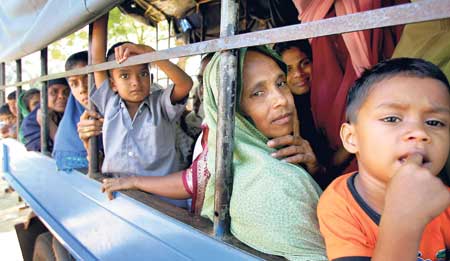
NGOs told to adopt good corporate practices to retain public trust
Non Governmental Organisations (NGOs) have been urged to adopt good corporate practices to retain public trust and increase funding. Billions of rupees flow to NGOs from local and foreign sources and business professionals point out that NGOs are now increasingly held accountable for such money donated in trust. “You are accountable to your stakeholders and you need to deliver optimum results to your stakeholders, so there is no difference between Non-Profit Organisations (NPOs) and corporates. For this, you need to ingrain some values starting with transparency, accountability, good governance and improved quality of service,” said former Ceylon Chamber of Commerce Chairman Chandra Jayaratne, speaking at the 2007 South Asian Regional Conference for NGOs organised by the Centre for Advancement of Resource Mobilisation (CARM), last week. “Nevertheless, you have to be able to raise funds for your work. This is vital. So you need to have good values and communicate them to the public,” said Jayaratne. Although Sri Lanka has separate accounting standards for NGOs, accounting practices of many, particularly smaller local NGOs, are seen as inadequate. This unprofessional approach to social service, starting with poor book keeping, makes it difficult to counter allegations of dishonest practices. “The first step is to be transparent. You must adopt the best international auditing standards. In Sri Lanka, we already have separate standards for NGOs. You must be able to provide regular statements of accounts in agreed formats to validate that resources are used for the purposes intended and not misused,” said Jayaratne. Concepts such as Donor Relations Policies and Service Agreements with donors are suggested to improve accountability. “Be open about your overheads. After all, you need money for your operations. So be open about it. But for that money, you must be accountable. Have a Donor Relations Policy. Every donor giving you money should know what he will get, his rights and what you will get and your obligations. Enter into comprehensive service level agreements with defined outcomes and delivery standards,” said Jayaratne. To increase transparency NGOs are advised to set up Trusts to manage funds. “Use Trust agreements and employ external Trustees and specialist managers. The Trustee will verify that money is spent for its intended purposes. So there is independent verification of your activities and trustworthiness. Then who will fear to give you money?,” said Jayaratne Given the crowding community service space, NGO are also advised to avoid competing with each other. “You must have some policy on competition. You must not compete with each other and try to bring each other down. That is not your purpose. You are providing a social service. So you should be able to pool your resources and not get into competition with each other,” said Jayaratne. The low level of reporting by national NGOs, says the NGO Secretariat could be because many NGOs are no longer active. Although Sri Lanka has NGO registration mechanisms, there is no de-registration mechanism. So once registered, the NGOs remain in the list, even when they are no longer operational. On top of this confusion, the NGO Secretariat estimates that about 20,000 Community Based Organisations, or small NGOs, are operational throughout the country, registered under Divisional and District Secretaries. In addition, NGOs are also set up under the Companies Act and through Acts of Parliament. Experts in the social service sector say Sri Lanka needs a national policy on NGOs and better monitoring and regulatory mechanisms. “The main problem is, we don’t have a broad based system to cover all NGOs in the country. There is also no national policy. A national policy sets out the government- NGO relationship and sets guidelines. Some countries, like the Philippines and Kenya, have tripartite bodies overlooking NGOs. Then it is not as bureaucratic as in the case of only the government monitoring. The tripartite committees set codes of conduct and codes of ethics for NGOs to operate,” said Jonathan Thambar, deputy chairman of the Centre for Advancement of Resource Mobilisation (CARM), and a former deputy director of Social Services. Outside the actual number of NGOs operating in the country, the total amount of money coming into the NGO sector and what it is used for, is anybody’s guess at this point because again, comprehensive data is not available. This poor tracking of large mounts of money spells trouble, starting with money laundering. “NGOs, unknowingly to them, can be used for money laundering and there have been some attempts already running into millions of dollars,” said Jayaratne. “There will be a very clear picture in the future. There will be only one central point for NGOs to register. We are discussing with the Colombo University to develop a database for the sector, funded by the Asia Foundation Institute. All the NGOs will be listed here. They will also be required to upload action plans and progress reports. Issuing of visa and work permits will also be done online. So there will be very close monitoring of NGO activities,” said the Director of the NGO Secretariat, Douglas Nanayakkara. The database is expected to be operational by March 2008. |
|
||
| || Front
Page | News
| Editorial
| Columns
| Sports
| Plus
| Financial
Times | International
| Mirror
| TV
Times | Funday Times || |
| |
Reproduction of articles permitted when used without any alterations to contents and the source. |
© Copyright
2007 | Wijeya
Newspapers Ltd.Colombo. Sri Lanka. All Rights Reserved. |
